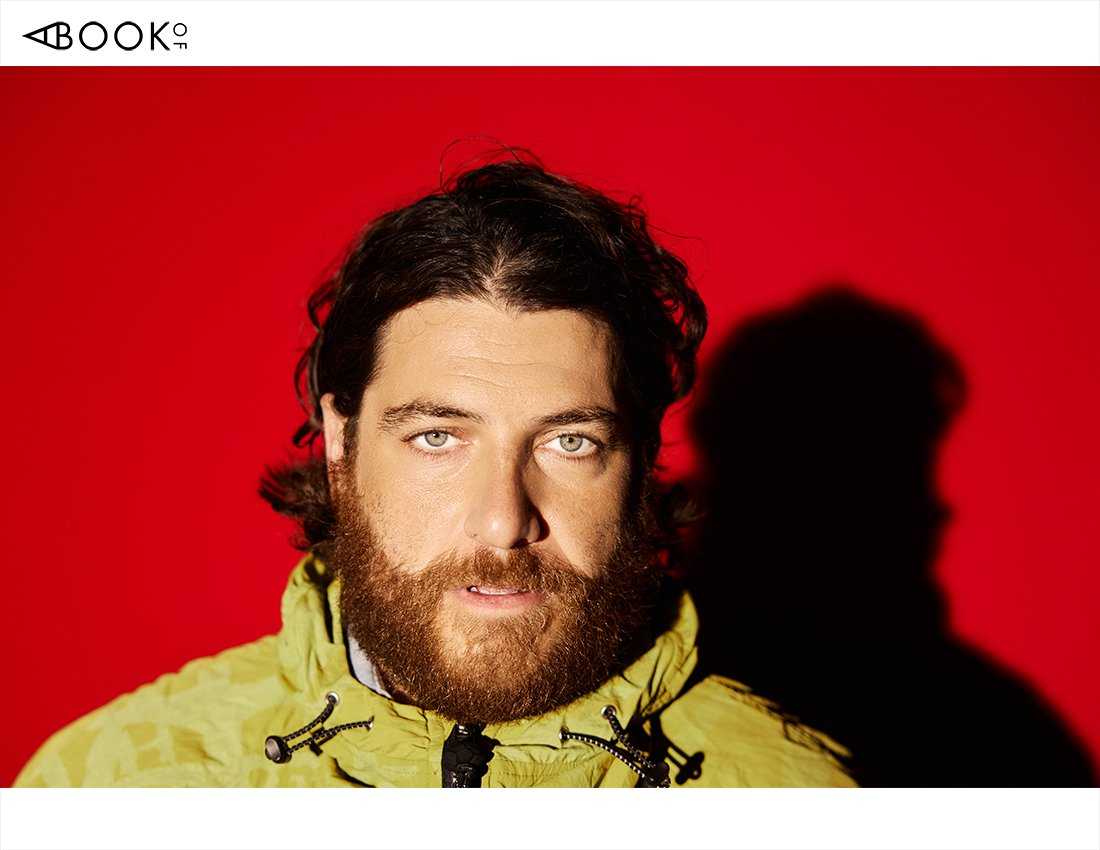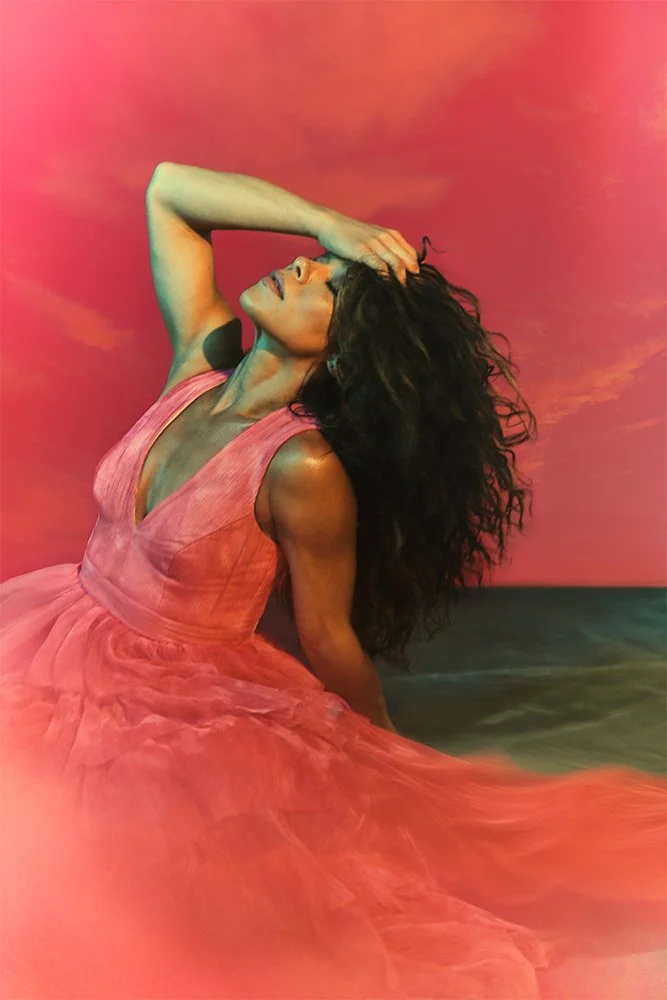NOSTALGIC NARRATIVES: HOW ADAM PALLY REVIVES THE PAST IN MR. THROWBACK
BY IRVIN RIVERA
PHOTOGRAPHER: JD BARNES @ TUNNEL MEDI AGROU, FASHION STYLING: OLIVIA PERDOCH, GROOMING: LAURA COSTA @EXCLUSIVE ARTISTS USING KEVIN MURPHY
ADAM PALLY, best known for his roles in “Happy Endings” and “The Mindy Project,” has always had a knack for blending humor with heartfelt moments. Now, with his latest project, “Mr. Throwback,” the actor and comedian takes his love for nostalgia and vintage culture to a new level. "I’ve always loved the idea of bringing old things back to life," Pally shares, reflecting on the inspiration behind the show, which he co-created with long-time collaborators. This series isn’t just another comedy; it’s a tribute to the past, wrapped in the kind of sharp, witty humor that Pally has become known for. "I’m busting out of my skin. I can’t wait for everyone to see it," he says with excitement.
Beyond the screen, Pally’s life is a balancing act between his creative pursuits and his role as a father of three. Known for his laid-back, relatable personality, he admits, "There are definitely times when I feel like I should be in a different place… but you just keep going." It’s this blend of authenticity and dedication that makes Pally’s journey as compelling as the characters he portrays. As he navigates the themes of nostalgia and change in “Mr. Throwback,” it’s clear that this project is more than just a job for Pally—it’s a reflection of his own journey through life, reimagined for today’s audience.
Hello Adam!.
Hi. How are you?
I'm doing well.
How's it going?
It’s been good. Thank you for your time today. I appreciate it.
Thank you so much for talking to me and talking about the show. It's so nice of you.
Yes! Congrats on the show by the way, excited to see it soon!
Thank you.
Aside from that, what's been keeping you busy and creative recently?
Well, this show has been kind of like all encompassing project for me, really. I put everything I had into it. I created it and wrote it with some of my best friends and people that I've been working with in this business forever. And you know, that takes all of my time- making a TV show. And then I have three kids who I try to be around for as much as I can.
How excited are you for this to be shown?
Oh, I'm busting out of my skin. I can't wait. I love it so much, and I'm so proud of it. And I can't wait for everyone to see it, and everyone to be in on the jokes that me and my friends have been in on for the last month or two. It's very exciting.
Your character in Mr. Throwback, dives deep into nostalgia, can you share how you relate to your character and any personal experiences that influence your portrayal of the character?
You know, I've been known to peruse a vintage story every now and then, and I really love the culture of it, and I love the idea of things that were old being brought back to life and I just really like vintage stuff. And there's a real Mr Throwback, who I know, who is a friend of mine, who is generous enough to let us use his store title as the title of our show. And we wanted to do that because we really wanted to give back to the community of these vintage dealers, because it really is a very tight-knit community that takes it very seriously, just like any other type of profession.
So, touching on the themes of nostalgia and change, which is kind of like the overall theme of the show, How do you think these themes resonate with today's audience, especially in the context of recent global events and stuff?
Um, well, I think everybody can identify with feeling like they're behind the eight ball as far as the money they have and the money they need to live. I think everyone can identify with feeling at some point like being drowned in bills and overwhelmed and pushed to do something crazy. And I think the problem with Danny is that he's kind of been conditioned to not, like they said about him in the pilot- hard to outrun that kind of trauma. And, you know, he doesn't really know when something is maybe not appropriate to be done. And he kind of just goes full bore at everything.
In creating the show, what are the challenges and highs that you've experienced during this entire process?
I mean the whole thing has been a high. Getting to meet and be friends with Stephen Curry is an amazing experience, he's truly one of those people that just has an amazing energy, and he is what he is all the time. He's sincere and he's present and he's funny and self-effacing. And so to have a partner like that is amazing, and then to be able to do it with Caspe and the Libman bros, who are my team, my boys, and I've done a bunch of shows with, and then to meet Tiffany and Eric Payton and everybody at unanimous, it just like the people are the most important thing always, and the highs of this have been the people.
It's great to hear that you guys have this tight-knit relationship with each other.
Yes, yes. I mean, me, the cast and Libmans have been working together for 15 years, so this felt like a culmination of a lot of years of putting in the work and then getting to do something that was truly our voice.
You mentioned earlier about the show being connected to vintage shops and stuff. Do you have anything precious and vintage in your possession right now that you're really proud and happy and excited about?
Oh yes. I mean, most of the things I own are old and vintage, but yes, I have a small watch collection that is vintage, and some guitars that are vintage. And a lot of my clothing, I have some really cool, especially after the show, some really cool pieces that are vintage from designers like some vintage Ralph Lauren. And so, I embrace that lifestyle, and I often think that used things, I'm attracted to buying them more than new things.
I was just going to ask, why do you think people have this affinity towards vintage stuff?
Well, there's always, you know, what's old is new and what's new is old. It's always like a cyclical thing in fashion. So I think, most things have been done in a way before, and there's always a source, there's always an inspiration, there's always a plug. And so I think people are just starting to be able to look back a little more and place the proper value on what those things were. And then little cultures happen where they become collectors and collector’s items and that's kind of the beauty of an interest.
Right. I like that you mentioned the cycle of things because a lot of things that are from the past are re-emerging. There's a lot of resurgence of technological items from the past on social media where kids are just finding out about it. For instance, the older cameras are now super expensive.
Right, exactly.
The lower the megapixel, the more expensive they are which is kind of wild.
Well, I mean, yes, look at music, right, the vinyl industry is a huge... and that's like antiquated technology kind of. But there's a time and place where you do want to put on vinyl.
Going back to Mr. Throwback, your character navigates various life lessons. Can you share any life lessons that you've learned throughout your whole career? Something you want to share.
You know, I wish I had more advice or stuff. But it's such a unique industry where everybody's journey is singular and no one can do the same thing as someone who's done it before, because they were like a unique person. So again, it's similar to fashion, you can be influenced by it, but there's always a source. There's always a plug. And so, you know, I don't know, I would say, strive for longevity. See how long you can go, because the more you do it, the better you get, and the more different fulfilling circumstances you're in and under.
I love that, striving for longevity, because a lot of people actually can start something, but not a lot of people can last long.
Yes... I hope to get better. You know? I hope that each of the shows that I make, and I made, a lot of them are different in every way and I hope, if I am retreading something, I hope I'm going back and making a better with the mistakes I've learned.
And that's how it is, like you evolved throughout this entire process.
Completely, yes.
For someone who played a wide range of characters across different genres, how do you prepare for such varied roles, and what challenges do you face in maintaining your versatility?
Um, you know, there's an improv, when I used to do a lot of improv at the Upper Citizens Brigade when I was a kid and I was learning. Um, there was this, one of our rules was, whatever you do, you do it to the best of your ability. So, if you're a doctor in a scene, you don't want to be like a bad doctor. You want to be the best doctor that you can and let them discover past that first blush of a doctor. So, I always just kind of approach it as like, this is the best version of whatever that character is that I can do. And then if there's technical work to learn, then you just have to throw yourself in and be like, I know I'm going to suck, but I'm going to learn it, whether that's playing guitar and singing, or roller skating, or, you know, playing basketball, whatever it is, you just like, you throw yourself in, you do the best you can, and you play to the best of your ability.
You just commit to it. Whether you're doing improv or scripted performances, you just totally commit to it.
A 100%.
Comedy often reflects societal issues. Now, how do you incorporate social commentary into your comedic work while maintaining the humor?
I think you have to take it project by project and try to use the project's vibe and integrity to steer where you want to go, and not the other way around. Because I think that's how things come out, preachy. And I certainly don't want to do that, because I don't feel confident in my own intelligence and choices to throw that on someone else. So I try to just present the most honest situation that I can and then live my life to the best core that I can.
Again, going back to the source, going back to your core, and just living your art and life through that core.
Exactly. We should write a self-help book together.
Haha. Yes! Your family life seems to be a big part of who you are. Now, how do you balance the demands of your busy acting career with your role as a husband and father?
Um, it's hard, and I don't know if I always do it that well, and I just kind of do the best that I can. And there are definitely times when I feel like I should be in a different place than I am, or I wish I was in a different place than I was, or sometimes I've made the wrong choice to be in a place where I shouldn't have been. I should have made a different choice of where I should be. And so like those things are, you have to try to not let those feelings stack up. And you have to just kind of approach it similar to my job, it's just like you're open and honest about doing the best job you can every day.
I like that. You just roll with it and not dwell on those things. Because I was just going to ask you, like, how do you deal with those things whenever those thoughts come to mind?
You just try not to dwell, because there's no choice. I learned early on as a kid, this is the only thing I'm really skilled at. I'm not really good at anything else. I don't like confrontation, I'm not good with science, I don't read or write very well, I am not great socially..., you know, I'm good at this. I'm good at whatever this job is, and so when you don't have any other choices, you don't even think about that, you just keep going.
Now, speaking of just keeping it going, how has your perspective on acting and the industry changed since you started? And what remains the same, based on your experience?
It's always the same. It's all the same. The jobs are different, sure, like TV and streaming and movies or whatever, and video games, the jobs are different, but it's always the same. If you're an actor, your goal is to be able to be paid money to pretend to be someone else and do something else. And that is hard to do. It's hard as a writer, producer, creator, to make a project for yourself, to get there, and it's hard to impress people, to say they want to put you in theirs. So my perspective hasn't really changed on it. It's all the same. And each audition is as hard as the first one I ever got. And each day on set is the same activity as the first day on set. You still have the same thing to do, just read your lines, act, think about it, be present and don't be late.
And that's like a thing, there's always this misconception from the outer perspective about actors. The more I interview actors, the more I hear like, what you're saying that this is it, this is the reality. It's pretty much like this, yes.
Yes, that's it.
Final question, Adam, if you were a book. What book would it be and why?
I think I would probably be something like Where the Sidewalk Ends, some collection of thoughts and stories. Some are complete, some are not. Some are fully realized, some are not. Some are just drawings, some are poems. And I think collectively, together, they make up a piece. And so I think I would be something like that.
I love that. It's like something that people can just pick whatever they want but as a whole, it creates that whole book.
Exactly.















![RYAN GUZMAN: FUELED BY FIRE [IN PRINT]](https://images.squarespace-cdn.com/content/v1/56c3533a37013b198dcdb996/1728757755981-D1PLKV5HMNR7I9787KP3/RYAN+GUZMAN+A+BOOK+OF+MAGAZINE+PRINT+COVER+web.jpg)




![TOMER CAPONE: PASSIONATE PURSUIT [IN PRINT]](https://images.squarespace-cdn.com/content/v1/56c3533a37013b198dcdb996/1722284693387-DYV7WBS749CHW93YHL10/A+BOOK+OF+TOMER+CAPONE+cover+Web.jpg)
![KAREN FUKUHARA: SILENT STRENGTH [IN PRINT]](https://images.squarespace-cdn.com/content/v1/56c3533a37013b198dcdb996/1721845615346-TVTXWUFM6U0SW38KUGKV/KAREN_FUKUHARA_ABOOKOF_COVER.jpg)

![CHACE CRAWFORD: THE DEEP IMPACT [IN PRINT]](https://images.squarespace-cdn.com/content/v1/56c3533a37013b198dcdb996/1718853333097-26RCKKTFFMKVBKXOJX1D/CHACE+CRAWFORD27805+copy+2.jpg)
![SASHA COLBY: ECHOES OF ALOHA [IN PRINT]](https://images.squarespace-cdn.com/content/v1/56c3533a37013b198dcdb996/1712191464541-T2IFJDZ47QDJPYSWS1RZ/ABO+SASHA+COLBY+WEB+COVER+.jpg)